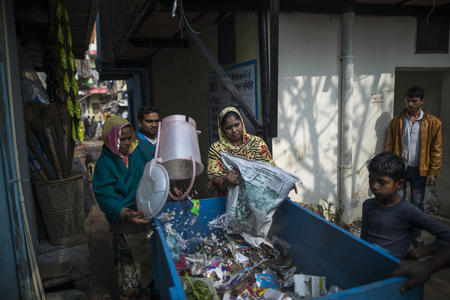Vasant Kunj, a prosperous and upmarket neighbourhood in Delhi is home to several prominent personalities. However, it is also home to hundreds of families living in a highly cluttered and swamped slum community (popularly known as jhuggi jhopadi basti) in Bandhu Camp.
In 1992, Prem Singh moved to Bandhu Camp from Uttarakhand [his hometown] with his wife and two children. He worked as a mechanic in a small garage close by.
The slum, at that time, lacked basics such as clean water and decent toilets. “There were a total of 235 houses in the slum and none of them had water and toilets. Government water tankers used to come from Kishangarh [a locality close by] and people would collect water standing in long queues,” shares Prem Singh. He also recalls that often holes were dug in the community to check whether there was water for them to collect.
“During those days, one person from each household had to let go of his/her job only to be able to stay at home and collect water from the tanker whenever it came… I was one of them too. Filling water and getting it home was time-consuming and so I had to let go of my job,” he claims.
With each passing year, Prem Singh and his wife began to grow apart which led to her and the children moving back to Uttarakhand. Prem Singh stayed in search of a job and a hope that his family would return one day. The lack of basic amenities such as water, toilets and a clean locality forced his wife to leave. “At least now they visit me once in six months,” he adds with a smile.
To pass his time, Prem Singh started working with the community people, their problems and solutions. Soon, he became popular in the community and was voted as the slum head (Sarpanch). “People from different states such as Uttar Pradesh, Bihar, and Jharkhand live here. I am the only one from Uttarakhand. Still, I have been voted as the Sarpanch since the last 25 years now… Maybe because I do not belong to any particular community, I am not biased and people are happy with that,” remarked Prem Singh.
As the Sarpanch, Prem Singh got authority and a position in the slum. His relationship with the community became an added advantage as people would listen to him. However, the condition of the slum failed to improve due to the lack of resources and amenities.
“It is just a year or two ago that the slum started looking like this,” shared Prem Singh as he explained the present situation. The slum today has a community toilet complex, the ground of which was earlier just a dump for garbage. He also shared how the water situation has improved, “We now have water supply at home. Earlier we used to stand in long queues and fetch water from across the road as there is a water collection centre for DJB Tankers. In February 2018, with the support from Bank of America, water pipelines were extended to the slum and the people further extended it to their households. It has been a big relief. We do not have to walk outside the slum to collect water or stand in long queues.”
In addition to water and toilets, the slum also has a proper drainage structure, which was not present earlier. The slum residents are much more aware about the importance of cleanliness and maintenance of water points, toilets, drains and the inner lanes. “People are conscious now. Some of them are also associated with the RWA (Resident Welfare Association). In addition, adolescent girls and boys are a part of youth groups. FORCE and WaterAid have provided trainings to the youth on rainwater harvesting, photography as well as survey techniques. The people have started to think about renovating their houses to multi-storey, educating their children and thus living a better life… We are now better than those who live in big flats [across the road]. Our community is as clean as theirs is, our children go to school regularly, and we will soon have a park (presently under construction) here. In those big flats, the people might not know each other, but here we all are well connected and are there for one another,” he claimed proudly.
“There were times when we used to feel ashamed of living here, especially when our relatives would come to see us. Now there isn’t any shame. We have multi-storey houses here with water and toilets [like everyone else in Delhi],” he added.
With the support of Bank of America, WaterAid India and its partner, FORCE, the community has access to clean water and decent toilets. The community toilet complex also has handwashing stations made to cater to the needs of everyone.
Even though Prem Singh misses his family, he seems to be happy for the community as they are now his family. Together, they have seen the problems as well as the improvements in the slum.
Access to water and toilets has provided the community with more time to learn, work and earn. Men and women are able to improve their standard of living by working for extra hours, while the children now have time to study and play.
“We have everything today. What we need is a boundary wall and a gate for security,” signs off Prem Singh.










